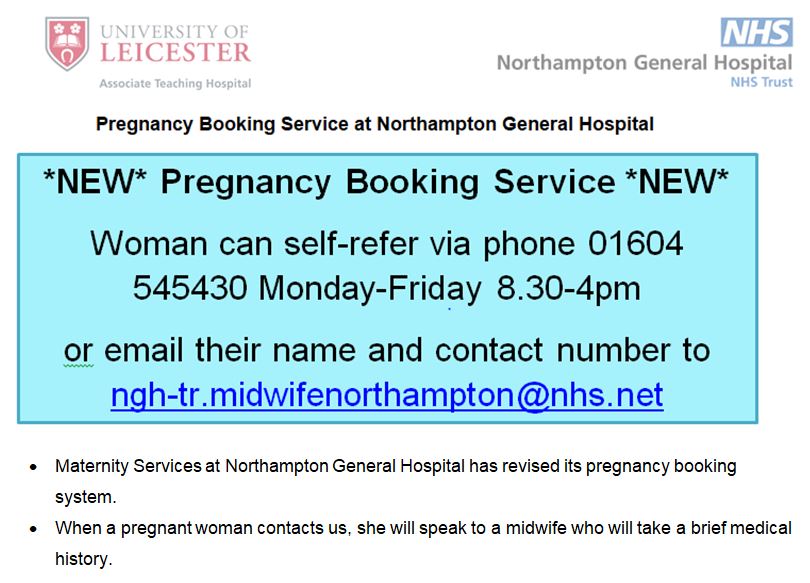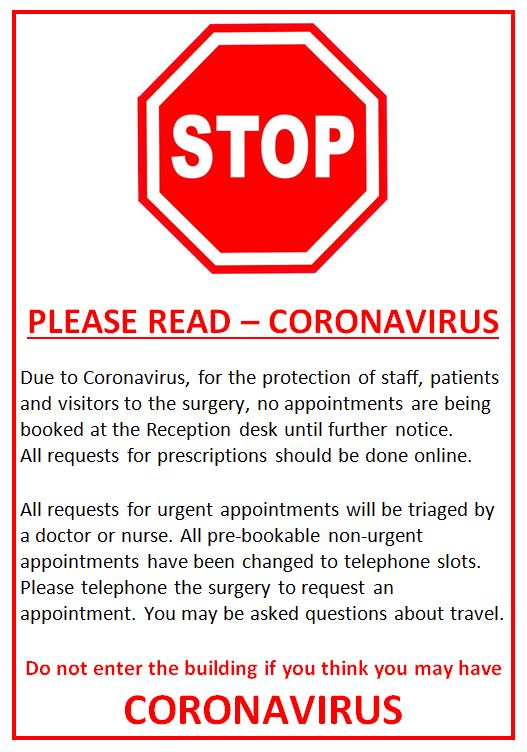MORE BOOKABLE GP APPOINTMENTS
ARE AVAILABLE IN NORTHAMPTON

6.30pm -9:30pm Weekdays and 9:00am-5:00pm Weekends
There are now more bookable GP appointments in Northampton, making it easier for you to get an appointment at a time that suits you including evenings, weekends and bank holidays.
The Northampton GP Ehanced Access Service is a new additional service that is an extension of your usual GP Practice, it is not a Walk-In-Service – You need to contact your GP Practice to make an appointment.
The Enhanced Access Service at evenings and week-ends is located on the ground floor of Highfield Clinical Care Centre, Cliftonville Rd, Northampton NN1 5BD (sited in between the Securicor and Avery Care Home buildings on Cliftonville Rd)
Getting here:
by Car: There are a limited number of free parking spaces available at the front of the building. Additional chargeable parking is available in the hospital grounds. |
by Bus: Several buses stop at the hospital and at the Cliftonville entrance which is closest to Highfield, buses include: Buses traveling east: 1, 5, 55 & VH services. Buses traveling west: 1, 5, 9B, 51 & VH services. |
by Bike: There are a number of covered cycle racks at the hospital and located at the front of Highfield. |
Who can access appointments?
Anyone registered with a GP Practice in Northampton
How do I book an appointment?
Contact your GP Practice in the usual way to request an appointment. If there is no appointments available for you at the practice they may offer you an appointment with the GP Extended Access Service, if this is right for you.
Will I see my own GP and/or Nurse?
You will be seen by experienced Northampton GPs and Nurses, but it is unlikely that you will be seen by your own GP or Nurse. If you would prefer to see your usual GP or Nurse, please book an appointment with your usual GP practice during their normal opening hours.
Will the GP I see have access to my medical record during my appointment?
Your medical record will, with your consent, be available to the Health Care Professional that sees you to ensure that they have the information they need to give you the best possible care.
A summary of your appointment will be sent back to your own GP practice electronically to ensure that your record is up-to-date. An appointment with this service will be just like an appointment at your own GP practice. Further information about how we use your medical record is available at www.northantsgpalliance.com/GDPR
How do I cancel an appointment?
If you need to cancel the appointment, please contact your registered GP Practice. A dedicated telephone number for cancellations will be shared soon.
When are these appointments available?
Appointments are available from 6:30pm – 9:30pm Weekdays, 9:00am -5:00pm Weekends.
Appointments need to be booked in advance.
Where do I go for my appointment?
The service is located on the ground floor of the main entrance of Highfield Clinical Care Centre, Cliftonville Rd, Northampton NN1 5BD.
To find out more about these services please visit www.northantsgpalliance.com/services-we-offer/gpea
GP Surgery: Appointments at the surgery with our Advanced Nurse Practitioner at are routinely pre-bookable, as are blood tests, blood pressure monitoring and other health checks with our Health Care Assistants.
Due to the high number of same-day acute medical cases, a large proportion of the available appointments with a doctor are used to meet the acute medical needs of our patients and for this reason are bookable only `on-the-day'.
If the Practice is closed please continue to use the NHS 111 service to contact the 24 hours / 7 days a week `Out-of-Hours' service if you urgently need medical help or advice but it's not a life-threatening situation. They will also be able to book an appointment for you with the GP Extended Access Service. Please note that your consent will be required in order for an appointment to be booked for you.
Call 111 if:
- you need medical help fast but it's not a 999 emergency
- you think you need to go to A&E or need another NHS urgent care service
- you don't know who to call or you don't have a GP to call
- you need health information or reassurance about what to do next
If urgent care is required, please call ‘111’ for further advice.
If your need is life threatening, please go to A&E or call 999.
Patient Triage NEW!
To meet the current challenges facing the NHS, we have adopted new models of clinical service delivery which now includes online access to Patient Triage. Please click the following hyperlink to begin: https://florey.accurx.com/p/K83020
Patients seeking to book an appointment for medical problems will now be offered an initial telephone triage call or telephone consultation with the nurse or the doctor. They will carry out an assessment and offer the most appropriate treatment. If the clinician needs to perform an examination they will make arrangements for a face to face appointment with you.
ONLINE CONSULATIONS: E-Consultations in the NHS
_________________________________________________________________________
Health A to Z Conditions and Treatments click here to begin
Appointments

A selection of our nurse and GP appointments are available for patients to pre-book up to 2 weeks in advance. In addition, we also release a large proportion of our routine appointments each morning at 8am. It is preferable to book in advance for a routine appointment but if all routine appointments are taken and your need becomes urgent you will be seen by a clinician but not necessarily the clinician of your choice. A chaperone will be available if you request one.
Our clinical team now includes a Clinical Pharmacist who offers both face-to-face and telephone appointments to deal with any issues that patients may have concerning their medication(s).
So that appointments are booked with the most appropriate clinician it is necessary for our staff to ask patients for a brief indication of their medical problem. Your co-operation in this regard is very much appreciated.
Consultations are by appointment only and it is often difficult for clinicians to effectively manage more than one problem at each consultation.
Please ring 01604 405006 to book an appointment or alternatively you can view, book or cancel appointments via the SystmOnline portal. From the 1 July 2019 we will be offering 25% of our available appointments via the online portal. If you have not as yet registered for online access please ask the staff at Rillwood M.C. to print out your unique registration details. It will be necessary for you to produce proof of your personal ID before being granted access to the online system.
When telephoning for an appointment, please say at the outset if your call is about a medically urgent or emergency problem.
If you are not seeking to book an `on the day’ appointment please ring after 2pm when the telephone lines will be less busy.
Late For Your Appointment
Please attend your appointment on time. If you are more than 10 minutes late the patient `check-in' system will automatically mark the appointment as a `Did Not Attend' and you may not be seen. If the clinician determines on the basis of your medical needs to see you, then you may have to wait until after other patients have been seen who arrived on time for their appointment.
If after arriving late for your appointment you are not seen then you will normally not be able to re-arrange your appointment until the next working day. This is to due to patient daily demand for appointments. However, a medical emergency that requires immediate attention will usually be assessed by a clinician on the same day.
Approximately one third of all routine appointments with the nurses and GPs can be booked in advance, typically up to 2 weeks but there may on occasions be exceptions to this e.g. where a clinician has arranged a specific follow-up date with the patient.
If you need to undergo a physical examination please do tell us if you would like to have someone accompany you (i.e. a chaperone) during the consultation.
Common Conditions Seen by the Nurse | | Other Healthcare that is routinely provided by the Nurse |
| Aches and pains | Rashes | Asthma & COPD routine monitoring checks |
| Allergies | Sore eyes | Blood Pressure monitoring |
| Bites and stings | Sore Throats | Coil Checks |
| Blood Tests | Sprains & Strains | Diabetic routine checks |
| Chest Infections | Urinary Tract Infections | Dressings |
| Coughs & Colds | Viral Illnesses | ECG’s |
| Ear Checks | Vomiting & Diarrhoea | Non-Travel Injections |
| Minor Burns & other Minor Injuries | Wound Infections | Patient Health Checks (age 40 - 74 years) |
| Nose bleeds | Other Minor Illnesses | Smears |
| | | Suture / stitches removal |
Text Reminder Service
We have a texting service which allows you to receive confirmation and reminders for your appointment(s).
To benefit from this service you will need to sign-up for this service by completing one of our consent forms.
Also, please remember to update your contact details with us when you change address, telephone numbers or email address.
We recognise that for some patients their work patterns make it difficult for them to attend the surgery during core opening hours (8am to 6.30pm). The launch of the new Extended Access service in Northampton from Monday, 1st October 2018 will offer patients improved access to routine pre-bookable appointments in the evenings and at week-ends. Please scroll down to the middle of this page for more detailed information.
Some Useful Telephone Numbers
For support with the management of minor ailments, please contact your local pharmacist or visit the NHS Choice website www.nhs.uk or call 111 – www.111.nhs.uk
Click Here for Your Guide to Local Health Services - Choose Well
For dental problems please arrange to visit your dental surgery. If you are not registered with a dental surgery you may contact one of the following dental services:
- Tel. 01604 639296 8am – 8pm Dental Service (Billing Road, Northampton)
- Mobile Tel. no. 07860 879279 Out of Hours Dental Service
For eye problems please arrange to visit an optician. For urgent eye care please go to the `Eye Casualty’ department at Northampton General Hospital.
This is open: –
- Monday-Friday : 8.30 - 5pm in the eye outpatient area
- Saturday : 9am - 5pm on the Singlehurst day case unit
- Sunday : 9am - 1pm on the Singlehurst day case unit
Ultra-Sound Investigations at NGH - Booking Appointments
COMMUNITY NURSING
Community Nursing provides countywide nursing care to housebound people only. Our service ranges from providing post-operative dressing changes to end of life care and long term conditions management. We also provide a small number of clinics for blood tests, complex leg ulcer management, routine catheter changes and a weekend practice nurse clinic in Northampton. Teams within Community Nursing are made up of phlebotomists, healthcare assistants, registered nurses, district nurses and advanced nurse practitioners.
Who is this service for? Community nurses provide high quality care for people in their own homes to promote and maintain independent living through information, guidance and training for patients, carers and families.
How to access this service: Referrals are accepted from GP and other healthcare professionals. Patients being discharged from hospital that require Community Nursing input will be referred directly to the service by the ward. Patients who are already on the Community Nursing caseload can find contact instructions in their patient folder.
Patients and carers can self-refer if already known to the community nursing, evening district nursing or unplanned intermediate care teams. To contact the District Nursing Team please phone the hub on 0300 777 0002.
Health Visitors - Out of Hours Service: 0300 1111 022
We can offer advice and support around minor illnesses. If you would like to speak to a Health Visitor please call the Out of Hours Health Visitor Advice Line on the telephone number below during the following times:
Monday to Friday 5pm - 8pm OR Saturday mornings between 9am - 1pm
Phone: 07834 754618
Maternity Community Office: 01604 545430
Midwife & Health Visitor Drop-in Clinics
Sure Start - Thorplands Children's Centre Tel. 01604 741131


TO HELP PREVENT THE SPREAD OF COVID-19 THE ONLINE APPOINTMENTS BOOKING FACILITY HAS BEEN SUSPENDED. You may still order prescriptions and view your hospital pathology results using SystmOnline.
If you are concerned about your symptoms please use the following NHS 111 online link https://111.nhs.uk/service/covid-19 to access the symptom checker tool.
Please note that due to the Coronavirus Pandemic the online appointment booking system has been temporarily suspended.
Please ring NHS 111 if you need urgent or Non-Emergency.jpg) help
help
The service is available 24 hours a day, 365 days a year to direct people to the right service as well as providing the local OOH call handling service and replacing NHS Direct. You can dial 111 from landlines or mobiles – all calls are free. There is a Typetalk service (18001 111) for the deaf and hard of hearing.